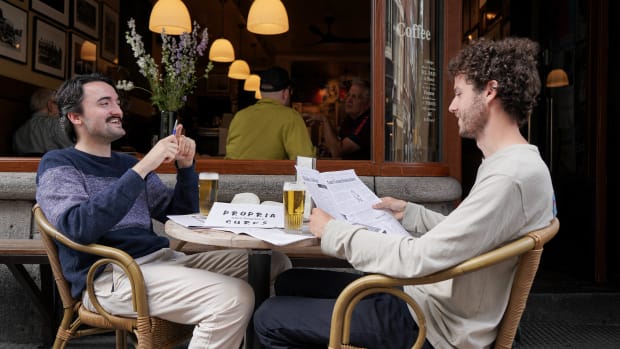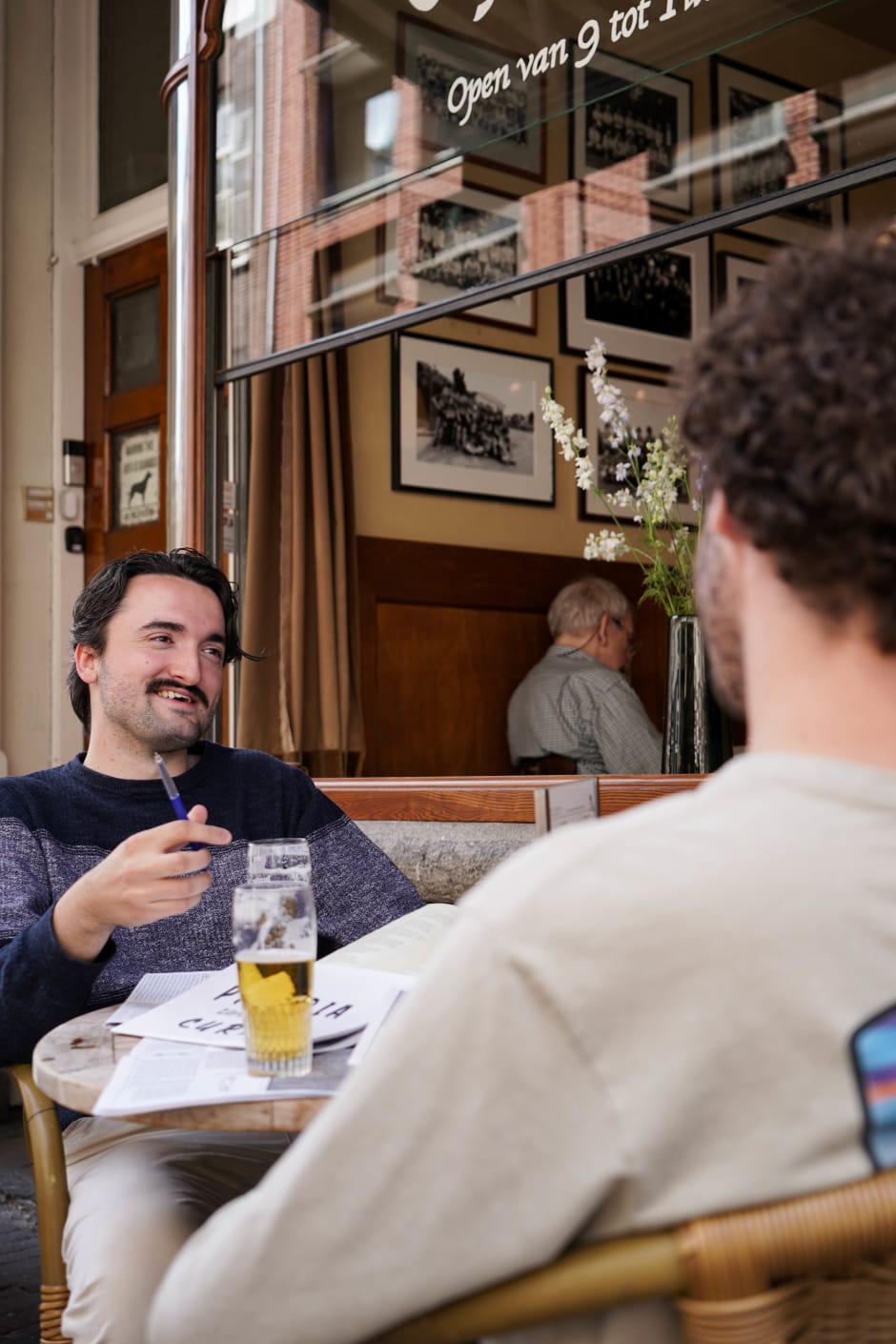
Propria Cures one year after conflict with UvA: “We are winning the war”
A year after the protracted conflict with the University of Amsterdam (UvA), the number of members of the satirical student magazine Propria Cures has increased significantly. The editors of the magazine are hopeful about the future. “PC will survive.”
Propria Cures editors Willem Fintelman and Ivar Staal arrive cheerfully on Wednesday afternoon at the terrace of writers’ café De Pels in the centre of Amsterdam. At 11:30 a.m., both men order a glass of wine, because the number of subscribers to “their” Propria Cures (PC) has risen by no less than 30 percent this year, despite its ban from the University of Amsterdam. But there is more to discuss. “Yes, yes, a complaint has been filed against me,” Fintelman reports with a grin. Writer Femke Brockhus recently posted on Instagram that she was going to go to the police. In April, Fintelman had written that Brokhus, author of Beesten die je niet mag schieten (Animals you are not allowed to shoot), was “pre-eminently an animal that should be shot” because of her writing.
Propria Cures has profiled itself as “literary satirical” since its inception in 1890, and once in a while it raises a stir. This happened, for instance, after an interview in 2008 with Albert Verlinde’s anus. The Leiden introduction committee thought this inappropriate and therefore decided to remove the PC in question from the bags of first-year students. The presenter himself could laugh about it, by the way.
Although many Dutch celebrities have been ridiculed in PC, in the past (literary) writers were often the target of ridicule, such as Leon de Winter and the late Harry Mulisch and Joost Zwagerman. Sometimes this led to a hefty riot. Infamous is the montage photo of Leon de Winter in a mass grave, posted at the time (1992) because he was said to have “exploited his Jewish background too much”. It landed the editors at the time with €10,000 in damages and a forced rectification.
Trash
An editor of the literary-satirical PC has to deal with minor issues, says Dutch student Fintelman. This also applies to the long-running dispute with the University of Amsterdam (UvA). In February 2024, PC published an article with the headline “Wanted”. Below it was a photo and the name of a UB employee. She was accused of systematically throwing PC copies in the rubbish bin. According to the PC article, the UvA employee – described as a “stylised manatee”, “walking tub of Nivea cream” and “customer of Adolf Hitler’s barber” – had thrown away the newspapers because she disagreed with the magazine's content.
“If you do something as sad as throwing away a leaflet from the library, you can of course expect a backlash,” says former student of Legal Philosophy Staal. The University Library employee denied throwing away the PCs in Het Parool this year, but did say he supported “such actions by colleagues”. In May 2024, the UvA informed PC that it would not tolerate employees being “accused and threatened (even with death)”. The university banned the distribution of PC on UvA campuses with immediate effect.
PC and the UvA had been linked for 135 years. Now the magazine has been banned for a year, but the number of subscribers is rising. Do you still need the university?
“Not really, apparently,” says Fintelman, beaming. But, he admits, it was a bit scary at first. “We are also dependent on students for the growth of our editorial team, for example. In the end, we received about as much interest in the editorial team as in the conflict in recent months. But it remains a pity that students cannot simply take our magazine with them.”
According to Fintelman, the increase in subscribers was due to media attention for the dispute with the UvA, including in Het Parool. “What’s more, people have to subscribe now that they can no longer take PC with them for free at the UvA. And we have another interview today.” He therefore concludes his monologue on a positive note: “PC will survive.”

What’s more, the magazine is still waging an underground battle against the UvA, Staal reveals. “We secretly leave PCs at the University Library. They often take them away again, but we’ll win that war in the end.” Fintelman: “Our ‘meeloper’ (litt. follower, a first-year PC student, ed.) has more stamina than the University Library staff.”
“I assume we will simply continue distributing them in the new University Library,’ says Staal. “The walls of the new University Library are already covered with quotes from Martinus Nijhoff (UvA alumnus and poet, ed.), who was, incidentally, a PC editor.”
Still, it feels empty without the PC bins. Don’t you want to return to the UvA at all?
“Of course we do, we would like to resolve the conflict. But we are not going to seek contact anymore,” says Staal firmly. “Our editorial team sent enough emails last year without receiving a response from the university.”
Ultimately, the PC editorial team confronted the UvA board last year during a walk-in consultation hour for students. Staal: “They came up with all kinds of excuses, even that the distribution was not sustainable.” The UvA board never personally engaged in dialogue with the editorial team, says the editor. Staal suddenly remembers: “They did steal our newspaper bins with ‘Propria Cures’ on them. We asked if we could have them back, but never received a response. I suspect they are now rotting away in a warehouse somewhere.”
The two editors say they remain open to a conversation with the UvA. Staal: “The magazine belongs to the university, but as long as the UvA shows no sign of wanting to talk, we’re not going to beg on our knees for reconciliation.”
In Folia, you said in January that, in hindsight, you might have written the article about the University Library employee differently. Did you ever consider letting the team leader know that the article went a bit too far?
Fintelman: “We’re not going to say sorry or anything like that. I still stand behind the photo and the headline of the article about the University Library employee,” he says. “We’re not talking about a regular staff member who accidentally removed some newspapers. It was a team leader at the University Library who deliberately threw our magazines in the bin out of frustration with the content of PC.”
Staal sees it somewhat differently. “I am sensitive to the argument that she is just an employee and did not seek publicity herself. Perhaps we should not have published the photo or her name. On the other hand, I also think that what she did was unacceptable.”
According to PC, your exclusion was also due to the fact that Executive Board chair Edith Hooge had a personal dislike for your magazine. This was allegedly because of a critical article about her husband Lennart Booij, who had been given a position for the 750th anniversary celebrations of Amsterdam in violation of European tendering rules. Hooge is currently absent due to illness, so perhaps a conversation is now on the table?
“I don’t know if that would make any difference,” says Staal. “If Peter Paul Verbeek (rector magnificus, ed.) is a different type of person, maybe. Then contact might be an option again...”
You once started an article with “This is not a joke: I am going to kill Pieter Omzigt ... I am going to mix novichok (a poison, ed.) into his boerenjongens and boerenjongens into his novichok”.
A piece submitted by Laurens Buijs, then a lecturer at the University of Amsterdam, was edited by PC in such a way that it was no longer an essay against “wokism” but against “child pornography”. Where does PC draw the line between what you can and cannot do and say?
“Nowhere, I think,” says Staal. “That’s the beauty of satire. And PC is one of the few that still operates in this area. The only other option, in my opinion, is to ban certain expressions. And who would then determine the limits of humour? The Executive Board of the UvA?”
A ban on humour isn’t the only way to stop publishing offensive things, is it? You can also simply not write certain things.
“We don’t have a mission as a magazine, but I do think you should be able to say anything,” says Staal. Fintelman smiles: “Everything we write in PC is funny and everything is true, of course... You don’t have to be a genius to understand that our magazine is satirical.” The editor shrugs his shoulders. “And if people can’t laugh at PC, that's really their problem.”
The UvA does not wish to comment on this article.However, the UvA states that PC never had its own bins, but that these were old Folia bins that PC reused under its own name.


